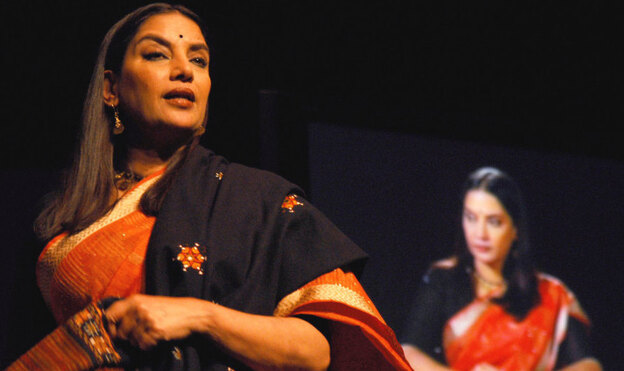
Identity Crisis: Shabana Azmi stars in playwright Girish Karnad's Kennedy Center production of Broken Images, about a Hindu short-story writer who wonders if she has betrayed her language and identity by writing an English best-seller.
Identity Crisis: Shabana Azmi stars in playwright Girish Karnad's Kennedy Center production of Broken Images, about a Hindu short-story writer who wonders if she has betrayed her language and identity by writing an English best-seller.
In a typical Bollywood dance number, a beauty queen might be seen singing in the rain as she awaits her lover's return. The leading lady is known for her beauty, her dance skills and her ability to deliver a convincing lip sync.
But Shabana Azmi is not your typical Indian movie star.
Yes, she's beautiful and she'll do the mainstream dance numbers ? but during her 40 years in cinema, Azmi has also portrayed women fighting for a place in Indian society.
"From rural to urban to middle class to across region[s], she in many ways encapsulates the portrayals of women in Indian cinema," says fellow Indian actress Nandita Das.
So while Azmi can play the Bollywood part, the actress, activist and sometime politician is better known for using the attention those roles attract to spotlight her more socially conscious projects.
Art As 'Instrument For Social Change'
Shabana Azmi is the daughter of acclaimed Indian poet Kaifi Azmi ? an active member of India's Communist Party ? and was raised in a secular Muslim family.
"I grew up in a family that believed that art should be used as an instrument for social change," Azmi says.
That belief has in many ways been a theme of her acting career.
The actress, now 60, recently starred in a sold-out performance of Girish Karnad's Broken Images at the Kennedy Center in Washington, D.C. The one-woman show tells the story of an unknown Hindi writer who finds fame after writing a best-seller ? in English.
"I'm Manjula Sharma," Azmi's character declares. "I must mention that officially I'm Mrs. Manjula Tiwari but my creative self continues to be Manjula Sharma. There are some areas in which we must not let marriage intrude too much."
Manjula Sharma goes on to describe Indian husbands as "caring but useless," a characterization Azmi believes will resonate among the Indian women who grew up with her films.
"Over the years, I've consciously not done films that in any way suggest that women are subservient to men," Azmi says.
More Than A 'Dancing Girl'
Playwright Girish Karnad says despite Azmi's fame, she's not exactly someone you'd characterize as glamorous.
"She's not someone who could have been an Elizabeth Taylor of Indian cinema," Karnad says. "If you look at her, she looks like an ordinary woman. It's only when she acts that she begins to glow."
And that glow has been known to cause quite a stir.
In 1996, Azmi starred in the film Fire alongside actress Nandita Das. It was the first Indian film to openly explore a lesbian relationship, and it was met with protests, death threats and the destruction of Indian cinemas. The Hindu right declared it wicked and an attack on Indian family values.
Five years later ? in the aftermath of the Sept. 11 attacks ? the actress debated Muslim cleric Syed Ahmed Bukhari, then the head of India's largest mosque, on live TV about the role of India's Muslims in the war on terrorism.
"He dismissed me by saying, 'We don't have to listen to dancing girls,' " Azmi recalls. "I don't think I could have paid him to make a remark like that ? that ... boomeranged on his career so badly. Because even amongst his supporters, they were shocked that he should use words like that."
'New Ideas' Of Acting And Activism
Azmi's willingness to take on institutions reflects more broadly on artists of her generation, the first to be born in a country free from British rule.
Indian filmmaker Ketan Mehta, who is part of that generation, says there was a certain freedom that came with being born in India after 1947.
"The post-Independence generation ... did not carry the baggage of the colonial past with them," Mehta says. "Therefore, we were all looking for new ideas. We were looking for something new to do."
For Azmi, that has meant becoming a human rights activist and serving in the Indian Parliament from 1997 to 2003. She has won countless awards for her activism and today serves as the head of Nivara Hakk ("Right to Shelter"), a nonprofit organization that works to empower India's slum residents.
Azmi continues to be a model for aspiring Indian actresses who want to be more than just "dancing girls." And she's hopeful that the rest of the film industry will take after her example.
"I'm hoping that for film actors, there is this kind of emotional trigger on any subject ? it need not be only slums, it can be anything," Azmi says. "Even if it is tentative, sooner or later it will, by its sheer force, engulf you in a way where you make a commitment and you get involved in it beyond ... an image-building exercise."
Source: http://www.npr.org/2011/05/31/136590458/shabana-azmi-acting-on-her-convictions?ft=1&f=1046
animal kingdom philippine news mgm grand kevin garnett shaq ann coulter showtime
No comments:
Post a Comment
Note: Only a member of this blog may post a comment.